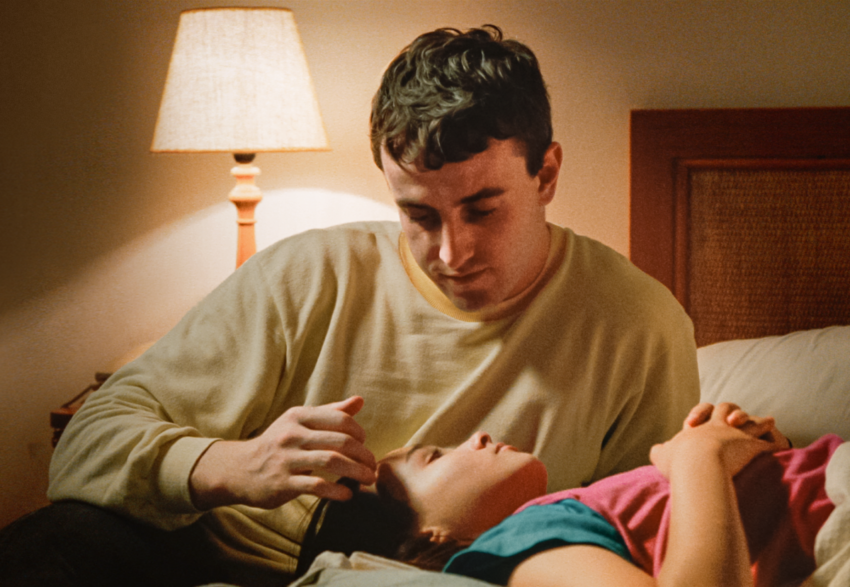Aftersun: The Art Of Not Seeing What’s Right In Front Of You

Paul Mescal Shines in Charlotte Wells’ Gripping Debut About Mental Illness, Adolescence, and What It Means To Be Seen
Growing up is learning the craziest secrets your parents had while raising you—the other side of Mommy and Daddy. Maybe they drank a little too much of that purple liquid you always assumed was just juice. Or perhaps they were a bit too friendly with the neighbor down the block. As you get older, your rose-colored glasses dissolve, and these secrets your parents had come to light. And, oddly enough, they’re there to help you put the pieces together.
But what happens if they’re not here anymore? And all you had to go off of was a faint memory of something that happened long ago.
This question stands at the forefront of Charlotte Wells’ Aftersun, consuming every frame of this deceptively simple film.
The film follows Sophie as she looks back on what is presumed to be the last vacation she took with her young father, Calum. From the very first shot, Wells paints the film as a recollection, a memory that’s been played over and over again. Framed through an old, clunky JVC camcorder, the shot focuses on Calum as an eleven-year-old Sophie records him dancing in their hotel room. She’s mortified, but she can’t help but laugh at goofy old dad. Things only take a turn once Sophie asks her father what his ambitions were when he was her age. Calum’s expression swiftly changes. No more goofy dad. Just a damaged, hollow shell of a man.
From here on, past and present weave in and out of the story like fabric trying to stitch together moments lost in the past. Even as an adult, Sophie can’t put her finger on it. On the missing piece. The one thing that could make sense of her dad’s behavior and why that was the last time she saw him.
Wells directs her narrative confidently, letting it unspool naturally with moments of silence that speak volumes. She often separates Sophie and Calum throughout their vacation for further insight into how these two act independently when they aren’t playing the roles of father or daughter. It’s here that we get the insight Sophie never got on that vacation. The side of Calum she never knew. He’s a heartbroken man who seems to be at a standstill in his life. Single, early 30s, with no career path in sight, he’s someone who feels as if life has already passed him by with nowhere to go from here.
Matching his understated performance in Hulu’s Normal People, Paul Mescal plays Calum with such a subtlety that we feel like Sophie. Nothing to go on but forced laughs and blank expressions. Whether it’s a glance of embarrassment of not being able to afford a rug or a shaded look of self-loathing when faced with his own mortality, Mescal bounces from emotion to emotion seamlessly, adding new depths to Calum with a single glance.
In an industry filled with Oscar-bait performances and campaign-driven wins, it’s hard to picture a world where Paul Mescal is nominated, let alone win, for his portrayal of Calum. But make no mistake; Mescal gives the best performance of the year. With so much under his belt in just a few short years, Mescal has continued to prove that he is one of the most talented up-and-coming actors out there, and I can’t wait to see what he does in the movie adaptation of Iain Reid’s Foe this year.
As her father struggles with his depression, young Sophie (precociously played by newcomer Frankie Corio) begins to come in on her own realization of the world and what it means to grow old. Yes, Wells provides us with scenes we’ve seen before (first kiss, hang-outs with older kids, etc.), but it’s the way that Wells juxtaposes these familiar scenes of youth with Calum’s fear of growing old that makes the whole thing feel new and exciting. As Sophie fantasizes about the future before her, Calum yearns for the past behind him. Mescal and Corio bounce off each other like steel balls in a pinball machine in the intimate scenes between father and daughter. Even through his pain and pessimism, Calum loves Sophie and is happy for the endless possibilities she has as someone beginning their life. There’s a tenderness between the two that’s rare in father/daughter relationships in film.
The film rolls forward at an admittedly slow pace, providing puzzle pieces for this troubled recollection, finally colliding into a brilliant finale that makes use of one of the best needle drops in recent years. To say anything more would be a disservice to the film. Let’s just say you’ll never listen to Under Pressure the same way again.
But none of this would have been possible without Wells’ appropriately restrained perspective, where it’s not what she shows us that’s important; it’s what she doesn’t. Every time we seem to be on the cusp of a revelation, Sophie is pulled out of the scene, leaving both her and us in the dark. What could have easily been frustrating in the hands of other directors is refreshing and thought-provoking underneath Wells’ watch. Nothing is ever given to us on a silver platter. Even Calum’s outcome can be interpreted differently among viewers. But that’s what makes Aftersun so achingly real. Moments pass, only to be forgotten in the movement of time. Memories fade no matter how many times we play them over and over again.
And, sometimes, questions never get answered.


Leave a Reply